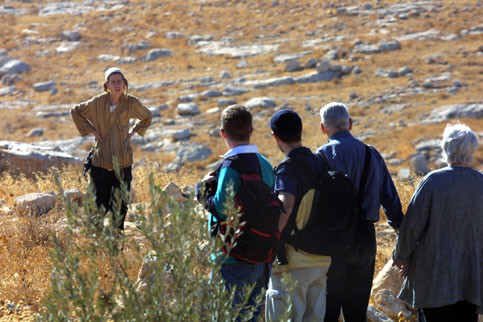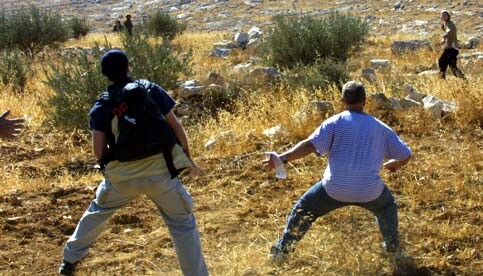West Bank 7 November 2003

International Solidarity Movement (ISM) peace activists confront an armed Israeli settler present to disrupt a Palestinian olive harvest. (Musa Al-Shaer)
I’ve come to this world as an outsider, as one actually born to the occupiers, as one to fight, one to learn and carry the truth home. It has been over six months now since I set foot on this much disputed land for the second time in my life. This land that I, my allies, and those I have come to support, call Palestine.
And that is where the conflict begins, the verbal attacks, the insults on my intelligence, the regurgitation of a brainwashing that I myself was raised under. I have seen though, am seeing, the truth that escaped my brainwashed upbringing. The part of the story that missed me because I was too busy being told about all the Arab terrorists and the importance of protecting the security of Israel, the place I was taught to strive for, my supposed homeland.
I have spent six months living across the line from the side that I should be on, according to my birth. Six months of waking almost every morning inside a cage, surrounded by the walls, fences and gates of those from that other side. These days, there is no way in or out save through a gate in this fence, controlled by soldiers from the other side. Even access to the rest of the West Bank is controlled.
After these months, only a blip compared the experience of those born and raised here, I can feel the stress building inside of me. The bottled-up tension that comes from having your every move, breath, thought controlled by another. Controlled by an occupier. The occupier, that although they will never admit it, treats every single being on this side of the line (now wall) as if a terrorist.
The hours of standing in the sun at a checkpoint waiting for permission to travel from university to home, being treated as less then human by 18-year-old boys who will close a checkpoint because the line formed (by those who have been standing in the sun for hours, waiting) is not “orderly” enough; the stress of this daily life, building, building, building, growing inside as if a ticking bomb.
Until one day the bomb becomes real and finally explodes full of frustration and rage. It is not propaganda in the school books, not inherent hatred that teaches people this behaviour, it is the lessons you learn in the streets. The soldiers that occupy, the soldiers that control, the soldiers that push down on you so hard there is no where to go save to fight.
For every morning that the children lose another day of education because the soldiers won’t open the gate in the wall, for every man that is blindfolded and handcuffed at a checkpoint for looking “suspicious”, for every child who cannot sleep the night through for the never ending shooting and tanks in the streets, a fighter is born. One who wants to resist, through stone, gun or body. All of those moments of life controlled by someone else, until the need to scream and fight back becomes manifest, and suddenly you fit the bill. The one they neatly created for you to fall into, or be pushed into as the case may be.
In all of the newscasts, political analysis, and lists of the dead, that fact will never be admitted. All you will ever be in their eyes, upon their lips, is a terrorist, motivated by hate, religion, and fanaticism. Never will the other side admit their own part in all of this. For me though, I can see the reality. From the ground up, I can feel it.
And now, the olive harvest has begun. Days upon days of wandering amongst the olive trees surrounded only by the sound of stick hitting tree, olives hitting ground. Many moments pass that allow me to forget the occupation even exists. If that be the case though, my presence here would be unnecessary, or drastically different at least. My presence, in case soldier or settler should choose to attack these farmers, would not be necessary.

ISM members, present to protect Palestinian farmers during the olive harvest, brace and duck as an Israeli settler throws stones at them. (Musa Al-Shaer)
Those moments of forgetting become few and far between though. The forgetfulness shatters every time I look up and see a settlement looming yards away, every time the soldiers set up a checkpoint between the olive groves and the farmers’ homes. Every time an F-16 fighter jet flies over head, every time we get a call that tanks are in the city streets — the ability to forget slips away.
These days, with the wall completed in this region of the West Bank, the rules have changed again. Now much of the farm land sits west of the fence, reachable only through gates in the wall, controlled by soldiers. Even those who have demeaned themselves in order to request permits to cross, permits that acknowledge the land on the other side is no longer theirs, are not allowed through at the whim of the soldiers. One day, only men over 35 are allowed through, the next only those without vehicles, the regulations changing minute by minute. At one gate, farmers were told only newly married men were allowed through, at another, soldiers demanded identification for the donkeys.
For weeks, the gates were closed altogether, no one being allowed through. The reason given by the soldiers? Sukkot, the Jewish holiday of harvest. Again, the ability to forget becomes lost when presented alongside the reality. This time that should bring an acknowledgement of commonality, as both sides celebrate their harvests, stands, as so much else does in this land, only to drive the sides further apart.
I do not portend to claim that either side of the line is perfect, innocent or pure. That there are not faults even on this side that I sit. I do and will continue to claim that the reality on this ground is not so easily disassembled as the broadcasters and analysts will have you think.
It is not as easy as the scared innocents verses the big bad terrorists. From the inside looking out, things become so much clearer. Daily encounters with the soldiers, most these days that admit to having been awake and on duty for 48 hours straight, have a way of clarifying reality, a way of allowing me to understand what is going on, in a way that newspapers don’t offer.
It is impossible for me to accept that anyone with an open heart and mind, who witnesses this situation on the ground or at least via alternative news sources, could come to any different conclusion.
Flo Razowsky is an Jewish American who lives in Minnesota and has been working with the International Solidarity Movement on the ground in Palestine.




